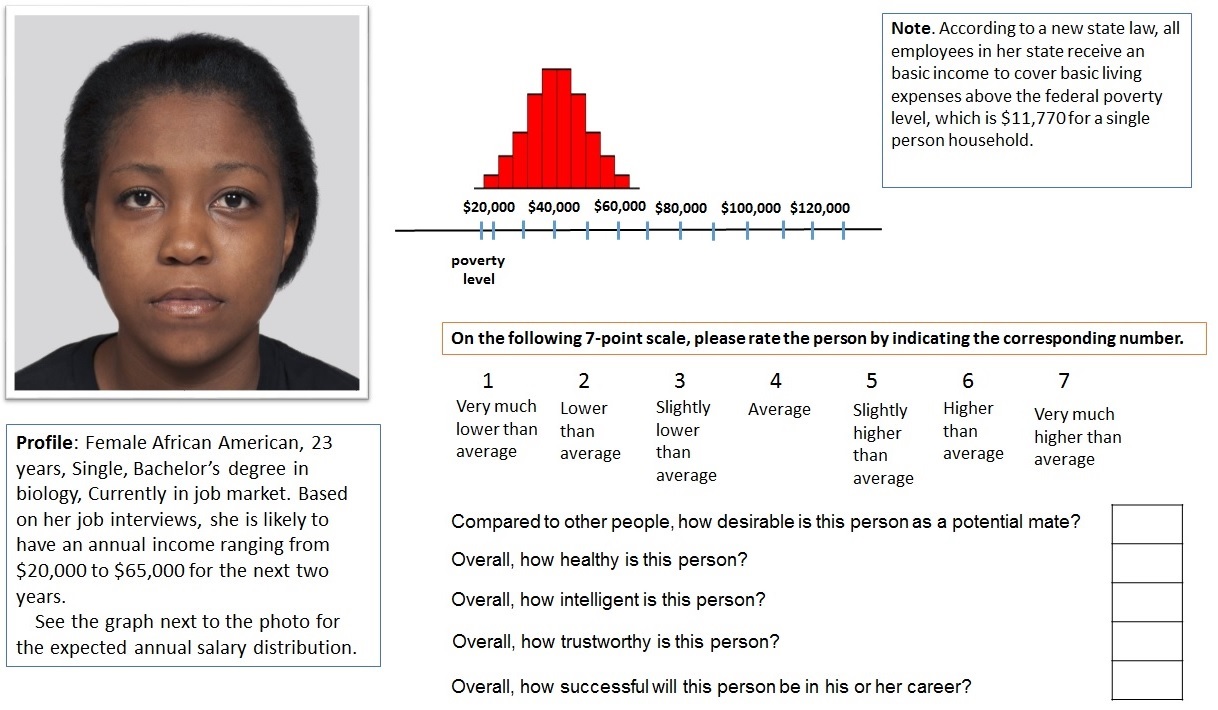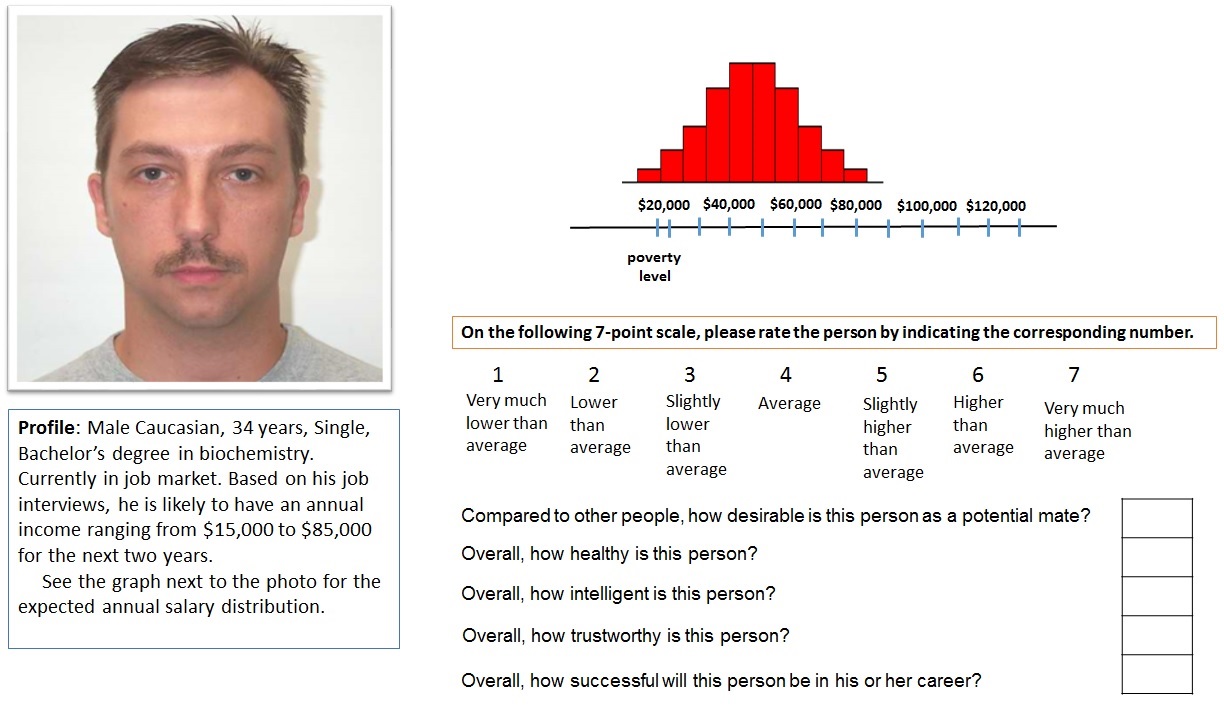About This Project
I will study social perception and mate values of basic income receivers in the eyes of general public. In the experiment, participants will review photos of protagonists with a brief profile. The protagonists differ in their expected range of annual income and if a basic income is provided. Participants will rate the mate values of each protagonist and provide their own salary goals under the basic-income vs. the control condition.
Ask the Scientists
Join The DiscussionWhat is the context of this research?
The idea of basic income has received close attention from economists, political activists as well as general public (1-2). For many advocates of basic income is a basic human right (3). For critics, a major concern about basic income is that it would cause a significant decrease in the motivation to work among citizens (4, 5). However, this concern was inconsistent with Maslow’s motivation theory which assumes that once basic level needs are fulfilled the next level up is what motivates us, and so on.(6, 7). Interestingly, although field studies were not conclusive but promising, a clear majority of voters seem unfavorable to implementation of the idea. This calls for more studies of possible psychological effects of basic income.
What is the significance of this project?
In the proposed research project, I will take an implicit approach to understanding how basic income may change social perception and assessment of a recipient of basic income without explicitly eliciting attitudinal or ideological judgments from the participants. In addition, I will examine the mutual effects of basic income assumption on goal settings and decision making of the participants. First, I would compare social perception and assessment of basic income receivers and none-receivers. Second, I will examine goal settings (desired and bottom salary, and most likely salary) and decision making of the participants either in the condition with a basic income assumed or in a control condition where the participants will not be primed by the basic income assumption.
What are the goals of the project?
In this project I will test the following predictions.I First, public perception of a receiver of basic income will be affected by the stereotype of recipients of social welfare and pension, and is likely to be associated with poverty, incapability, weakness, etc. (13, 14). This stereotyping will overall reduce the rating scores of the protagonists in the basic income condition. Second, under the basic income condition, attention of the participants will be shifted up to their goal, since the minimally required needs are guaranteed (15, 16). In addition, as an endowment, basic income will increase psychological value of the owned basic income (17). As a result, the participants will have a higher salary goal, be more future oriented, and more comfortable for taking risks.
Budget
The budget items are required for conducting the proposed experiment and help to present the results at professional conferences.
Endorsed by
Meet the Team
Team Bio
One graduate student and one undergraduate will assist the project in preparation of experimental material and data collection.
X.T. (Xiao-Tian) Wang
X.T. (Xiao-Tian) Wang is a professor of psychology at the University of South Dakota whose interdisciplinary research bridge behavioral decision making, risk management, evolutionary psychology, and neuroscience. He was visiting or adjunct professor at Peking University, Max Planck Institute in Germany, CEIBS China-Europe International Business School, Singapore Management University, and Hong Kong University of Science and Technology. He is the co-editor of the book “Thus Spake Evolutionary Psychologists” (2011, Peking University Press) and the co-author of the book (in Chinese) “The Wisdom of Evolution and Rationalities of Decision Making (2016, East China Normal University Press). He has published papers in 25 different peer reviewed journals and provided services for 52 professional journals. His research was sponsored by NSF, James McDonnell Foundation and KC Wang Foundation. His studies are cited in multiple textbooks and covered by popular media such as Time magazine, Wall Street Journal, Science News, Yahoo News et al.
Additional Information
Method and Procedure
In this study, the participants will review photos of individuals with brief information about each of them. In the “basic income” condition, all individual protagonists will have an income for basic living but differ in their estimated ranges of additional income, displayed as graphic distributions. In the “control condition”, there will be no guaranty for basic income. Other information about the protagonists, such as age, education, race, etc. will be used as control variables (covariates) in analysis
There will be three types of income distributions in the “basic income” condition: expected annual income ranges from $20,000 to $45,000, from $40,000 to $65,000 and from $80,000 to $100,000. In the control condition, there will be a fourth income distribution besides the above three: expected annual income ranges from $20,000 to 125,000. Thus, there will be seven income distributions: 3 in the basic income condition and 4 in the control condition.
All the participants will be asked to evaluate and rate each of the protagonists on a 7-point scale in terms of (1) his or her overall desirability as a potential mate when compared to other people (see Figures 1 and 2 for illustration), (2) how healthy, (3) how intelligent, (4) how trustworthy, (5) how successful will this person be in his or her career, compared to other people.
There will be 14 photos, randomly selected from a larger data base, for each participant to evaluate: 7 income diminutions x 2 gender of the protagonists.
The photos of the potential mates and their gender will be counterbalanced between the “basic income” protagonists and non-receiver protagonists. Any differences between the two conditions will reveal psychological effects of basic income on mate values.
Nest, all participants will be asked to provide their goal (desired) salary, most likely salary, and minimum required salary for their next job in a Midwest city in the US, such as Chicago. Half of the participants will be asked to imagine that there is a basic income for their next job; the other half without stating this income condition.
In addition, each participant will be asked to make as set of risky choices between a sure thing and its gamble equivalent (e.g., $100 for sure vs. a 50-50 chance to gain $200 or zero) and a set of intertemporal choices between a smaller-and-sooner reward and a larger-and-later reward (e.g., $50 now vs. $65 in two months).


References
1. Widerquist, K. (2013). Independence, propertylessness, and basic income: A theory of freedom as the power to say no. Springer.
2. Government of Canada (1994). Improving social security in Canada guaranteed annual income: A supplementary paper. Retrieved 30 November 2013.
3. Van Parijs, P. (2004). Basic income: a simple and powerful idea for the twenty-first century. Politics & Society, 32(1), 7-39.
4. Deutscher bundestag: Problematische auswirkungen auf arbeitsanreize (2013). Bundestag.de. Retrieved 5 June 2016.
5. Bertram, C. (March 1997). Need for basic income: An interview with Philippe Van Parijs, Imprints, Vol. 1, No. 3
6. Maslow, A.H. (1943). "A theory of human motivation". Psychological Review. 50 (4): 370–96.
7. Maslow, A.H. (1954). Motivation and personality. New York, NY: Harper. ISBN 0-06-041987-3.
8. Hum, D., & Simpson, W. (2001). A guaranteed annual income: From Mincome to the millennium. POLICY OPTIONS-MONTREAL-, 22(1), 78-82.
9. Belik, Vivian (5 September 2011). A town without poverty? Canada's only experiment in guaranteed income finally gets reckoning. Dominionpaper.ca.
10. Basic income grant coalition: Pilot project". BIG Coalition Namibia http://www.bignam.org/BIG_pilot.html Retrieved November 27, 2016
11. Krahe, D. (2008). How a basic income program saved a Namibian village. Spiegel Online. http://www.spiegel.de/international/world/a-new-approach-to-aid-how-a-basic-income-program-saved-a-namibian-village-a-642310.html
12. Vorlage Nr. 601 – Vorläufige amtliche Endergebnisse (2013). https://www.admin.ch/ch/d/pore/va/20160605/det601.html
13. Gorski, P. (2008). The Myth of the “Culture of Poverty”. Educational Leadership, 65(7), 32.
14. Cozzarelli, C., Wilkinson, A. V., & Tagler, M. J. (2001). Attitudes toward the poor and attributions for poverty. Journal of Social Issues, 57(2), 207-227.
15. Wang, X.T. & Johnson, G. J. (2012). A tri-reference point theory of decision making under risk. Journal of Experimental Psychology: General, 141, 743-756.
16. Wang, X.T. & Dvorak, R. D. (2010). Sweet Future: Fluctuating blood glucose levels affect future discounting. Psychological Science, 21, 183-188.
17. Wang, X.T.*, Ong, L. S., Tan, J. H. (2015). Sense and sensibility of ownership: Effects of ownership experience on valuation of goods. Journal of Behavioral and Experimental Economics, 58, 171-177.
Project Backers
- 0Backers
- 0%Funded
- $0Total Donations
- $0Average Donation

